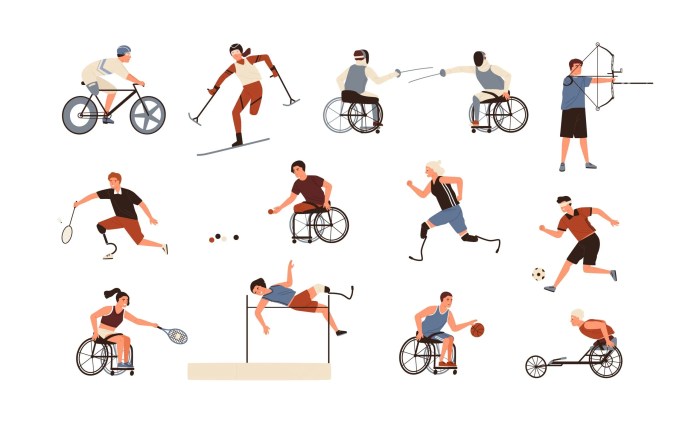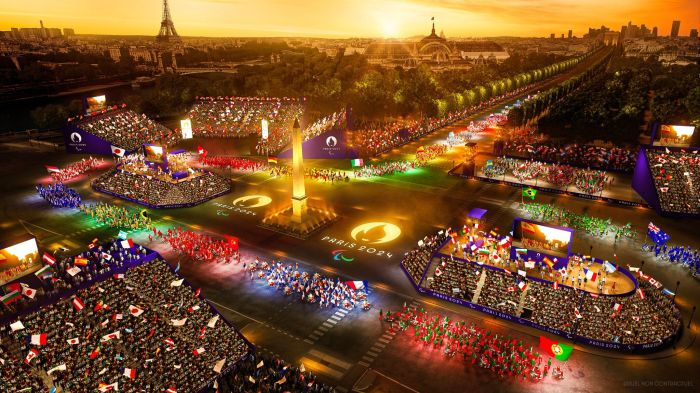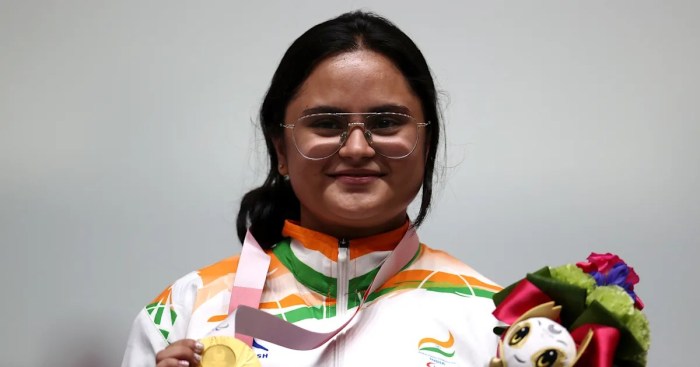When was the first paralympic games held – When were the first Paralympic Games held sets the stage for this enthralling narrative, offering readers a glimpse into a story that is rich in detail and brimming with originality from the outset. The Paralympic Games, a testament to human resilience and athletic prowess, have evolved from humble beginnings to become a global sporting spectacle.
This journey began in Rome in 1960, marking a pivotal moment in the history of disability sports and societal attitudes towards individuals with disabilities.
The first Paralympic Games, held in Rome in 1960, were a groundbreaking event that brought together athletes with spinal cord injuries from 23 nations. The Games, initially known as the “International Wheelchair Games,” were organized by Sir Ludwig Guttmann, a British neurologist who pioneered the use of sports rehabilitation for individuals with spinal cord injuries.
The Games showcased a range of sports, including archery, athletics, swimming, and wheelchair fencing, and served as a platform to demonstrate the athletic abilities and potential of individuals with disabilities.
The Birth of the Paralympic Games

The Paralympic Games, a global sporting event for athletes with disabilities, have evolved significantly since their inception. Their history is deeply intertwined with the evolution of attitudes towards disability and the development of rehabilitation programs. Understanding the origins of the Paralympic movement provides insights into the progress made in inclusivity and the recognition of the athletic potential of individuals with disabilities.
The Origins and Evolution of the Paralympic Movement, When was the first paralympic games held
The Paralympic movement can be traced back to the aftermath of World War II. During the war, many soldiers sustained injuries that resulted in disabilities. Recognizing the need for rehabilitation and reintegration, Sir Ludwig Guttmann, a German-born neurologist, established the Stoke Mandeville National Spinal Injuries Centre in England in 1944.
At Stoke Mandeville, Guttmann introduced sports as a vital part of the rehabilitation process, believing that physical activity could enhance both physical and mental well-being. In 1948, Guttmann organized the first Stoke Mandeville Games, a competition for wheelchair athletes.
This event marked a significant milestone in the history of Paralympic sports. The Games were held on the same day as the opening ceremony of the London Olympic Games, a symbolic gesture highlighting the shared spirit of athleticism and human resilience.
Over the years, the Stoke Mandeville Games grew in size and scope, attracting athletes from other countries. In 1960, the first Paralympic Games were held in Rome, Italy, coinciding with the Summer Olympic Games. This event marked the official recognition of the Paralympic Games as an international sporting event.
The Paralympic Games have since expanded to include a wide range of sports and athletes with various disabilities. The Games are now held every four years, alternating between Summer and Winter editions. The Paralympic movement has become a global phenomenon, promoting inclusivity, equality, and the recognition of the athletic achievements of individuals with disabilities.
The Role of Sir Ludwig Guttmann
Sir Ludwig Guttmann played a pivotal role in the establishment and development of the Paralympic Games. His pioneering work in rehabilitation and his belief in the transformative power of sports for individuals with disabilities laid the foundation for the Paralympic movement.
Guttmann’s vision extended beyond physical rehabilitation; he sought to empower athletes with disabilities and challenge societal perceptions of their capabilities.Guttmann’s legacy continues to inspire and shape the Paralympic Games. His commitment to inclusivity, his belief in the potential of athletes with disabilities, and his pioneering work in rehabilitation have left an enduring mark on the Paralympic movement.
The First Paralympic Games
The inaugural Paralympic Games, held in Rome, Italy, in 1960, marked a pivotal moment in the history of adaptive sports. This event not only showcased the athletic abilities of individuals with disabilities but also fostered a sense of inclusivity and equality.
The Games in Rome
The first Paralympic Games, officially known as the “IX Paralympic Games,” were held in Rome, Italy, from September 18 to 25, 1960. The event was organized by Dr. Ludwig Guttmann, a neurologist who had pioneered the use of sports as a rehabilitation tool for individuals with spinal cord injuries.
The Games were held in the same venues as the 1960 Summer Olympics, which had taken place a few weeks earlier.
Participating Nations and Athletes
A total of 400 athletes from 23 countries participated in the inaugural Games. The majority of the athletes were wheelchair users, but there were also athletes with other disabilities, such as amputations and cerebral palsy. The participating nations included:
- Argentina
- Australia
- Austria
- Belgium
- Brazil
- Canada
- Denmark
- Finland
- France
- Great Britain
- Greece
- Hong Kong
- Iceland
- Ireland
- Israel
- Italy
- Japan
- Luxembourg
- Netherlands
- Norway
- Philippines
- South Africa
- Sweden
- Switzerland
- United States
- West Germany
Key Events and Sports
The 1960 Paralympic Games featured a range of sports, including:
- Archery
- Athletics (track and field)
- Swimming
- Wheelchair fencing
- Table tennis
- Weightlifting
These events showcased the incredible athletic abilities of the participants and highlighted the potential for individuals with disabilities to excel in sports.
Legacy and Impact of the First Games: When Was The First Paralympic Games Held
The 1960 Rome Paralympic Games, a groundbreaking event in the history of disability sports, left an enduring legacy that transformed the landscape of disability inclusion and athletic competition. The Games not only showcased the extraordinary athletic abilities of individuals with disabilities but also served as a catalyst for societal change, paving the way for a more inclusive and accessible world.
Impact on Disability Sports
The 1960 Games marked a pivotal moment in the development of disability sports. Prior to this event, opportunities for athletes with disabilities to compete at an international level were limited. The Rome Games not only provided a platform for these athletes to demonstrate their skills but also inspired the creation of new sports and organizations dedicated to promoting disability sports worldwide.
The Games helped to legitimize disability sports as a legitimate form of athletic competition, attracting greater attention and resources.
- Increased Participation:The Games ignited a global movement, encouraging individuals with disabilities to engage in sports and pursue their athletic dreams. This surge in participation led to the establishment of national Paralympic committees and the development of training programs for athletes with disabilities.
The first Paralympic Games were held in Rome in 1960, a pivotal moment in the history of adaptive sports. While exploring the world of gaming, one might consider delving into the captivating world of black myth wukong ps5 review for a unique and immersive experience.
Returning to the Paralympic Games, their significance lies in their celebration of human potential and the breaking down of barriers, much like the innovative gaming world offers.
- Development of New Sports:The Rome Games showcased a diverse range of sports, including wheelchair basketball, swimming, and archery. This inspired the development of new sports specifically designed for athletes with disabilities, further expanding the Paralympic movement.
- Technological Advancements:The Games also spurred innovation in assistive technology, leading to the development of specialized equipment and adaptive sports gear that enabled athletes with disabilities to compete at higher levels.
Evolution of the Paralympic Games

The Paralympic Games have undergone a remarkable transformation since their inception in 1960, evolving from a small gathering of athletes with spinal cord injuries to a global sporting spectacle that celebrates the achievements of athletes with a wide range of impairments.
This evolution has been marked by increasing participation, expanding sports, and growing recognition of the Paralympic movement’s significance in promoting inclusivity and challenging perceptions of disability.
Growth and Development of the Paralympic Games
The Paralympic Games have witnessed a steady growth in participation and scope since their inaugural edition. Initially, the Games were limited to athletes with spinal cord injuries, but over time, they expanded to include athletes with a wider range of impairments, including amputees, visually impaired athletes, and athletes with cerebral palsy.
The number of participating nations has also increased dramatically, reflecting the global reach and growing popularity of the Paralympic movement.
| Year | Host City | Number of Participating Nations | Notable Events |
|---|---|---|---|
| 1960 | Rome, Italy | 23 | The first Paralympic Games, featuring athletes with spinal cord injuries. |
| 1964 | Tokyo, Japan | 21 | The first Paralympic Games held outside Europe. |
| 1968 | Tel Aviv, Israel | 29 | The first Paralympic Games to include athletes with cerebral palsy. |
| 1972 | Heidelberg, Germany | 42 | The first Paralympic Games to include athletes with visual impairments. |
| 1976 | Toronto, Canada | 41 | The first Paralympic Games to be held in North America. |
| 1980 | Arnhem, Netherlands | 40 | The first Paralympic Games to be held in a non-capital city. |
| 1984 | New York City and Stoke Mandeville, United States | 44 | The first Paralympic Games to be held in the United States. |
| 1988 | Seoul, South Korea | 61 | The first Paralympic Games to be held in Asia. |
| 1992 | Barcelona, Spain | 83 | The first Paralympic Games to be held in the same city as the Olympic Games. |
| 1996 | Atlanta, United States | 104 | The first Paralympic Games to be held in the same city as the Olympic Games. |
| 2000 | Sydney, Australia | 129 | The first Paralympic Games to be held in Australia. |
| 2004 | Athens, Greece | 136 | The first Paralympic Games to be held in Greece. |
| 2008 | Beijing, China | 147 | The first Paralympic Games to be held in China. |
| 2012 | London, United Kingdom | 164 | The first Paralympic Games to be held in the United Kingdom. |
| 2016 | Rio de Janeiro, Brazil | 159 | The first Paralympic Games to be held in South America. |
| 2020 | Tokyo, Japan | 162 | The Paralympic Games were postponed due to the COVID-19 pandemic. |
| 2024 | Paris, France | TBD | The Paralympic Games will be held in the same city as the Olympic Games. |
Comparison of the First and Contemporary Paralympic Games
The first Paralympic Games in Rome in 1960 were a relatively modest affair, with 400 athletes from 23 nations competing in 18 sports. The Games were held over a period of four days, and the focus was on showcasing the abilities of athletes with spinal cord injuries.
In contrast, the contemporary Paralympic Games are a massive global event, with over 4,000 athletes from over 160 nations competing in 22 sports over a period of 11 days. The Games are now held in the same city as the Olympic Games, and they have become a major sporting event in their own right.
The Paralympic Games have evolved significantly since their inception, demonstrating a remarkable commitment to inclusivity and the celebration of human potential. From a small gathering of athletes with spinal cord injuries, the Games have grown into a global sporting spectacle that showcases the achievements of athletes with a wide range of impairments.
The Paralympic movement has also played a significant role in challenging perceptions of disability and promoting greater understanding and acceptance of people with disabilities.
The Paralympic Movement Today

The Paralympic Games have evolved into a global phenomenon, showcasing the extraordinary abilities of athletes with disabilities and inspiring millions worldwide. The movement has grown significantly in terms of participation, media coverage, and societal impact, solidifying its place as a major sporting event and a powerful advocate for inclusion.
Global Reach and Participation
The Paralympic Games have witnessed a remarkable expansion in terms of both participation and global reach. The International Paralympic Committee (IPC) currently has 185 member countries, representing a vast and diverse group of athletes. The number of athletes competing in the Paralympic Games has also increased significantly over the years, with over 4,000 athletes participating in the 2020 Tokyo Games.
This growth reflects the increasing recognition and acceptance of Paralympic athletes around the world, as well as the development of Paralympic sports programs in more countries.
Impact on Athletes and Communities
The Paralympic Games have a profound impact on the lives of athletes and their communities. For athletes, participating in the Games provides an opportunity to showcase their talent, achieve personal goals, and inspire others. The Games also offer athletes with disabilities a platform to challenge societal perceptions and demonstrate their abilities.
Beyond individual athletes, the Paralympic Games also have a significant impact on communities. They promote inclusivity, break down barriers, and foster a greater understanding and acceptance of people with disabilities. The Games can also inspire young people with disabilities to pursue their dreams and lead active and fulfilling lives.
Inspiring Stories of Paralympic Athletes
The Paralympic Games are filled with inspiring stories of athletes who have overcome adversity and achieved greatness. These athletes have defied the odds, demonstrating resilience, determination, and an unwavering commitment to their sport.
“The Paralympic Games are a celebration of human spirit, showcasing the incredible achievements of athletes who have overcome significant challenges. These athletes inspire us all to strive for excellence and to believe in the power of human potential.”
Andrew Parsons, IPC President
For example, Oscar Pistorius, a South African Paralympic sprinter, became the first amputee to compete in the Olympic Games. His participation in the 2012 London Olympics sparked a global conversation about inclusion and the potential of athletes with disabilities. Similarly, Beatrice Vio, an Italian wheelchair fencer, has won multiple Paralympic medals and is a vocal advocate for inclusivity and disability rights.
Her story serves as a testament to the power of determination and the ability to overcome challenges.